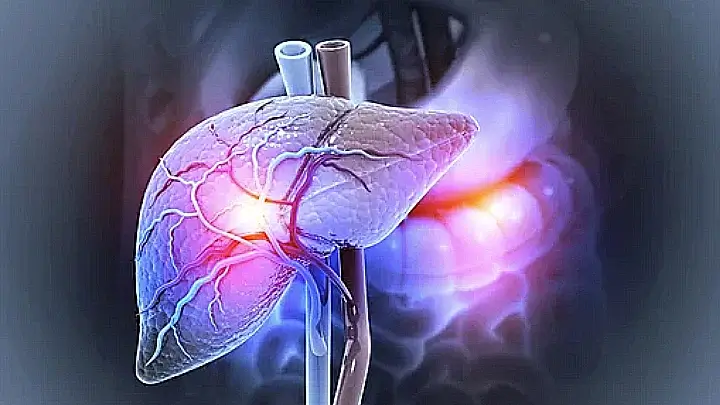Knowledge Assessment Quiz

Fatty Liver Knowledge Assessment Quiz
Which of these is NOT a type of fatty liver disease?
What percentage of liver cells must be affected by fat for a diagnosis of fatty liver disease?
Which of these conditions is NOT a risk factor for fatty liver disease?
What is the most effective treatment for fatty liver disease?
Which diet is recommended for managing fatty liver disease?
What percentage of adults in Western countries are estimated to have NAFLD?
Which of these symptoms is most specific to advanced fatty liver disease?
Your Results
Understanding Fatty Liver Through Knowledge Assessment
A healthy liver plays a crucial role in processing nutrients, filtering blood, and fighting infections. However, fatty liver disease, a condition where fat builds up in liver cells, can disrupt these vital functions. Fatty liver disease is increasingly common and is often tied to lifestyle factors. With rising rates of non-alcoholic fatty liver disease (NAFLD) and non-alcoholic steatohepatitis (NASH), it’s essential to understand the condition, its risk factors, and management strategies. This article, paired with the Knowledge Assessment Quiz, provides foundational insights into fatty liver disease and helps you assess your understanding of this condition.
Causes and Risk Factors
Fatty liver disease can develop due to multiple factors, with each contributing to liver stress and fat accumulation:
- Diet and Obesity: Excessive intake of high-calorie, processed foods and a sedentary lifestyle increase fat accumulation in the liver.
- Diabetes and Insulin Resistance: Type 2 diabetes and insulin resistance are strong risk factors for fatty liver. When the liver becomes insulin-resistant, it stores more fat.
- High Cholesterol: High levels of blood cholesterol and triglycerides can further increase liver fat content.
- Genetics: Family history of fatty liver can raise individual risk, though lifestyle choices are often more influential.
A common misconception is that low blood pressure can contribute to fatty liver disease. However, low blood pressure is not a risk factor; instead, high cholesterol, obesity, and type 2 diabetes are primary concerns.
Diagnosing Fatty Liver Disease
Diagnosing fatty liver typically involves imaging tests such as ultrasounds, which can reveal fat buildup, and blood tests, which assess liver enzyme levels. For a fatty liver diagnosis, at least 5% of liver cells must be affected by fat, as mentioned in the quiz. Advanced cases may require further testing, including MRI or liver biopsy, to determine the extent of inflammation and scarring.
Managing and Treating Fatty Liver Disease
The cornerstone of managing fatty liver is lifestyle modification. Currently, there is no FDA-approved medication specifically for treating NAFLD or NASH, making lifestyle changes the most effective intervention:
- Healthy Diet: The Mediterranean diet is recommended, focusing on vegetables, whole grains, lean proteins, and healthy fats. This diet reduces liver inflammation and promotes overall metabolic health.
- Regular Exercise: Physical activity helps reduce liver fat, improves insulin sensitivity, and supports weight management. Both aerobic exercise and strength training are beneficial.
- Weight Loss: Even a modest weight loss of 5-10% can significantly improve liver function and reduce fat.
- Monitoring and Support: Regular check-ups, liver enzyme monitoring, and medical support can help manage the disease progression.
Symptoms and Complications
In its early stages, fatty liver disease often presents no symptoms. As it progresses, individuals may experience fatigue, abdominal discomfort, or jaundice (yellowing of the skin and eyes) in advanced stages. The latter is a specific symptom of liver damage and usually appears only after significant liver function impairment. Detecting the disease early can help prevent progression to severe complications such as liver fibrosis or cirrhosis.
The Importance of Knowledge in Fatty Liver Management
Knowledge is a powerful tool in managing any health condition. This quiz not only assesses your understanding of fatty liver but also helps clarify common misconceptions and expand your awareness of risk factors and prevention methods. Understanding these details can empower you to make lifestyle choices that protect your liver health and potentially reverse early-stage fatty liver disease.
Conclusion
Whether you scored high on the quiz or found room for improvement, this exercise is a step towards better understanding fatty liver disease. Leveraging this knowledge, you can take proactive steps to reduce risk factors, make dietary improvements, and adopt a healthy lifestyle. Understanding the types, causes, and treatment options for fatty liver empowers you to make informed decisions, work with healthcare providers effectively, and potentially reverse early-stage liver disease. Keep learning, stay proactive, and remember that every positive lifestyle change can make a significant difference in liver health.
 Disease
Disease Diets
Diets Recipes
Recipes Supplements
Supplements Management
Management Calculators
Calculators Quizzes
Quizzes Glossary
Glossary









